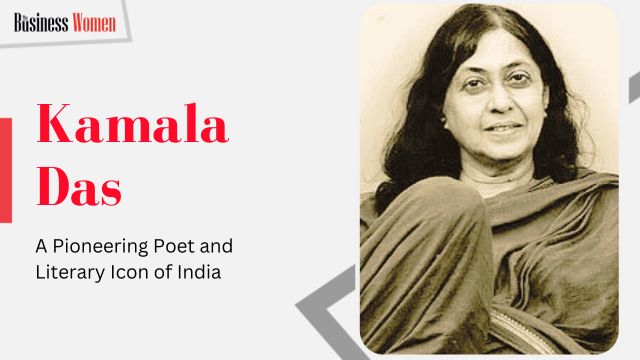Kamala Das, originally known by her pen name Madhavikutty, stands as a prominent Indian poet, author, and columnist whose influence resonates deeply within both Indian and global literary spheres. Her remarkable legacy is characterised by her unabashed and courageous exploration of female sexuality, coupled with her distinctive poetic voice. Let’s delve into the captivating life and enduring impact of this extraordinary literary figure.
Early Life and Childhood
Born on March 31, 1934, in Punnayurkulam, Kerala, India, Kamala Das was the daughter of V. M. Nair, a managing editor at the widely circulated Malayalam daily Mathrubhumi, and Nalapat Balamani Amma, a renowned Malayali poet. Raised in a milieu steeped in literature, with familial connections to notable writers, Kamala’s formative years were infused with a deep appreciation for poetry.
Her upbringing was a blend of urban and rural experiences, divided between Calcutta, where her father was based for work, and her ancestral home in Punnayurkulam. These diverse environments profoundly shaped her later literary works.
Literary Career
Kamala Das embarked on her literary journey fearlessly, delving into themes of love, sexuality, and societal conventions. She emerged as a pivotal figure in the Indian English poetry scene during the 1960s and 1970s. Her debut poetry collection, “Summer in Calcutta,” introduced a refreshing perspective to Indian English poetry, exploring themes of love, betrayal, and emotional tumult. The bold and explicit nature of “The Descendants” encouraged women to embrace their femininity and desires unabashedly.
In 1976, Kamala Das penned the daring autobiography “My Story” (originally “Ente Katha” in Malayalam), offering a candid yet controversial account of her life. Her poems, characterised by their bold and frank expression, tackled themes of freedom, love, and societal taboos. “Dance of Eunuchs” sheds light on the inner struggles of eunuchs, bringing attention to their marginalised existence.
Her literary oeuvre extended beyond poetry to include acclaimed short stories and novels, such as “Neermathalam Pootha Kalam,” “Alphabet of Lust,” and “Padmavati the Harlot.”
Personal Life
Married at the age of 15 to Madhav Das, Kamala Das continued to pursue her literary passions amidst her marital obligations. In 1999, at the age of 65, she embraced Islam, adopting the name Kamala Surayya. This decision stirred controversy, but Kamala Surayya remained resolute in her choices.
Kamala Das breathed her last on May 31, 2009, at the age of 75, succumbing to pneumonia. She was laid to rest with full state honours at the Palayam Juma Masjid in Thiruvananthapuram, Kerala.
Legacy
Kamala Das’s legacy is grounded in her profound contributions to Indian English poetry and her fearless advocacy for female sexuality and empowerment. Her poetry and writings continue to inspire readers and writers worldwide. In 2018, Google honoured her with a Doodle, acknowledging her significant impact on literature.
Translated into numerous languages, Kamala Das’s works have solidified her position as a global literary icon. Her unapologetic voice challenged societal norms, establishing her as a trailblazer in an era when such frankness was often discouraged. Her legacy as a pioneering poet and author remains vibrant.
Awards and Recognitions
Throughout her illustrious career, Kamala Das received accolades such as the PEN Asian Poetry Prize, the Kerala Sahitya Akademi Award for Story for “Thanuppu,” and the Kendra Sahitya Academy Award for English poetry. She was shortlisted for the Nobel Prize in Literature in 1984.
Kamala Das’s impact on the literary world and her steadfast commitment to free expression continue to be celebrated, cementing her status as one of the most influential poets in modern Indian literature.









